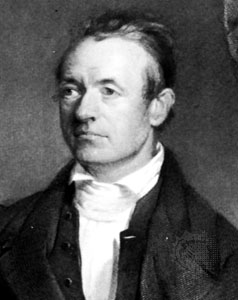Over at Kevin DeYoung’s blog, Jason Helopoulos asks “ Does Calvinism Kill Missions? ” and answers with a resounding historical ‘no.’ I agree, and want to put a little finer point on it: from the perspective of Baptist history, Calvinists birthed the missions movement. (For background on Calvinism/Arminianism in the Baptist context, see links below.)

I’ve recently been reading Jason Duesing’s fascinating volume Adoniram Judson: A Bicentennial Appreciation of the Pioneer American Missionary , which has a great deal of fresh information on the celebrated Baptist missionary Judson and his context. I was particularly intrigued by Robert Caldwell’s essay on the “New Divinity” theology and Judson’s preparation as a missionary. The New Divinity theologians, heirs of Jonathan Edwards such as Joseph Bellamy and Samuel Hopkins, argued that a right understanding of Calvinism would prompt activism for the gospel. The New Divinity helped to birth important reform movements such as antislavery advocacy and the American missions movement. (English Calvinist Baptists such as William Carey also spearheaded the British missionary initiative.)
Although Baptists in America were overwhelmingly Calvinist in the early national period, it is still surprising to note how much the Congregationalist-dominated New Divinity influenced key Baptist missions organizers, including Judson, his first wife Ann Hasseltine, and Mary Webb, the founder of Boston’s Female Society for Missionary Purposes (1800), America’s first women’s missionary organization. Judson, Hasseltine, and Webb all grew up in Congregationalist families but eventually converted to Baptist principles. (The Judsons’ journey to Baptist convictions is described powerfully in Gregory Wills’s essay in Duesing’s Adoniram Judson .)
Judson, his father, Hasseltine, and Webb were especially influenced by Nathanael Emmons, perhaps the most popular New Divinity preacher of the early national period, who is largely forgotten today. Theologians regard Emmons’ Calvinism as somewhat eccentric, combining features that seemed at times hyper-Calvinist, at other times quasi-Arminian. But there was no doubt for Emmons that salvation depended on God’s eternal decree, not human decision. Emmons was also one of the era’ s greatest promoters of missions. Webb resolved to start her society after hearing Emmons preach on 2 Chronicles 15:7 , “Be ye strong therefore, and let not your hands be weak: for your work shall be rewarded.”
Many Arminians have also served courageously as missionaries, and still do today – that is beyond question. But history belies some Arminians’ (including a number of Southern Baptist Arminians’) contention that, when followed logically, Calvinism undercuts missions and evangelism. If God has decreed who will be saved, they say, and that decree is irresistible, then why bother to obey Christ’s Great Commission and bring the gospel to all the world? This critique may make logical sense, from an Arminian perspective. But from a historical perspective, it is simply false.
Background links:
Calvinism vs. Arminianism – Comparison Chart , Grace Online Library
my “‘Traditional Baptists’ and Calvinism” , Anxious Bench
Southern Baptist Convention’s Statement from the Calvinism Advisory Committee
Cross-post at the Anxious Bench .
You have a decision to make: double or nothing.
For this week only, a generous supporter has offered to fully match all new and increased donations to First Things up to $60,000.
In other words, your gift of $50 unlocks $100 for First Things, your gift of $100 unlocks $200, and so on, up to a total of $120,000. But if you don’t give, nothing.
So what will it be, dear reader: double, or nothing?
Make your year-end gift go twice as far for First Things by giving now.


